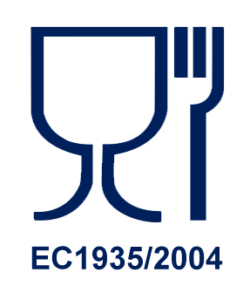EC1935/2004 Regulation
Food Contact Materials Regulation (EC) 1935/2004
Previous requirements for Food Contact Materials (FCM) varied significantly from country to country. In 2004, the European Commission decided to establish a single piece of legislation to standardise it within the EU. They particularly focused on EC1935/2004, which controls the requirements on materials for food contact applications. M Barnwell Services provides a wide range of products in accordance with the EC1935/2004 regulation, which includes O Rings, Gaskets, Custom-made components, and many more.
What is EC1935/2004?
EC1935/2004 is a European legislation, which uniforms the food industry and standardises materials and articles planned to come into contact with foods (Food Contact Materials). This legislation came into force in April 2009. Netherlands Food and Consumer Products Safety Authority (NVWA) checks the compliance.

What are the general requirements?
Materials and articles (active* and intelligent*) should be produced in conformity with good manufacturing practices (EC2023/2006). The reasoning behind it is that under typical or expected conditions of use, they don’t transfer their elements to food in amounts that could:
- endanger human health
- cause an unacceptable change in the composition of the food (taste, odour)
- adversely impact the organoleptic properties* of the food
Phrases explained
*Active materials and articles – materials and articles intended to prolong the shelf-life to sustain or enhance the condition of packaged food.
*Intelligent materials and articles – materials and articles which monitor the condition of packaged food or the environment surrounding it.
*Organoleptic properties – a set of features including taste, smell, appearance, including colour and texture of foodstuffs, which can be distinguished and judged by human senses.
Other Requirements
To avoid contamination and adverse taste changes, EC1935/2004 specifies that the transfer of substances (contaminants) between the material and the food must remain within particular tolerance. This regulation is the structure that defines other requirements, which concern:
- Documentation
- Materials
- Quality – Good Manufacturing Practice (EC2023/2006)
- Traceability
What groups of materials are covered by the legislation?
EC1935/2004 defines the following groups of materials:
- Active and intelligent materials and articles
- Adhesives
- Ceramics
- Cork
- Rubbers
- Glass
- Ion-exchange resins
- Metals and alloys
- Paper and board
- Plastics
- Printing inks
- Regenerated cellulose
- Silicones
- Textiles
- Varnishes and coatings
- Waxes
- Wood
What EC1935/2004 regulated products does M Barnwell Services provide?
If the transfer of contaminants stays within particular tolerance, the material is allowed to be used with food. M Barnwell Services provide a wide range of EC1935/2004 regulated materials and products.
They include:
- Camlock Gaskets
- Diaphragm Seals – Rolling and Flat
- DIN11864-2 Seals – Aseptic Flange Unions
- D Ring Seals – for pipe connections
- Encapsulated O Rings
- Hygienic Clamp Seals – HyClamp / Tri-Clover / Tri-Clamp / PolyClamp
- IDF Gaskets – for use in IDF (International Dairy Federation) pipe fittings
- O Rings
- PTFE Seals – Non-stick solutions
- RJT Seals – Ring Joint Type O Ring Seals
- SMS 1149 Seals – Swedish Metric Standard
- X-Ray and Metal Detectable Seals
- Butterfly Valve Seals – The Pipe Seal, the Operating Shaft Seal, and the Flange Seal
- Custom-made Components
If you require further information regarding our range of products and/or services, please contact a member of the team.
E & OE.